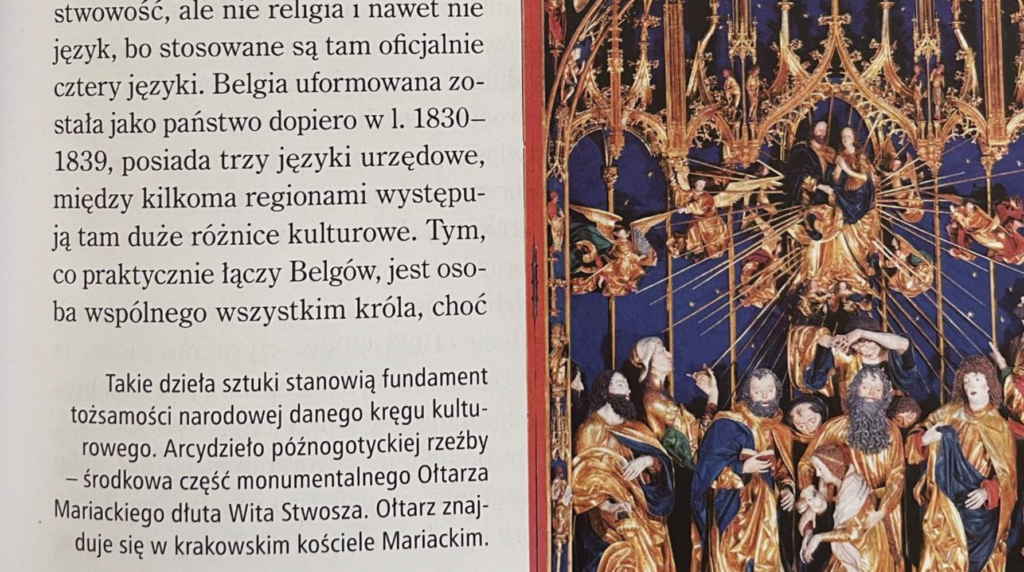Starting this school year, students in the ninth grade of public schools in Poland will be enrolled in a new obligatory course titled 'History and the Present,' including a textbook that puts the Catholic Church at the forefront of teaching and contains anti-LGBTQ, anti-feminist and anti-EU messaging.
The newly introduced course is seen by some parents as political indoctrination and has been publicly criticised by pupils. Aside from propagating traditional and Catholic views, the book heavily attacks EU leaders and countries, including Belgium, and follows the extremist political line of the ruling party.
"According to the official textbook, the question of why Brussels is the most suitable city to be the capital of the EU is easily answered: it is because Belgians lack national identity," Rafał Markiewicz, a Polish national who translated parts of the book for The Brussels Times, explained.
The text, co-written by one of the ruling party's ideologues, historian Wojciech Roszkowski, cites the fact that Belgium has only been an independent state for fewer than 200 years, its three official languages and the cultural differences between the various regions as reasons that have led to the "diminishing of its national identity."
Markiewicz himself lives in the Netherlands, but his daughters are still at school in Warsaw. "If they want to continue their studies, they have to learn and pass this insane subject," he said. Within Poland, he said the new subject has become the topic of intense discussions.
"History and the Present as a whole is a manual for the younger generation on how to become a healthy, Christian and national conservative patriot," Markiewicz said.
Attacking atheism, feminism and globalisation
The new subject was pushed for by Poland's ruling Law and Justice (PiS) government, a far-right and national conservative political party which has a mutually beneficial close relationship with the Catholic Church.
Even pupils who opt out of religion-focused subjects are forced to take the class where they are taught about the "supremacy of the Christian system." For some, this is a sign that the government is tightening the screws on authoritarianism.
Aside from its passing comment about Belgium's lack of national identity, the book consists of various other assertions and political positions. It makes far-fetched claims on topics such as sexual liberation — which it claims is undermining family values and causing more divorces – atheism and feminism. It also claims that tolerance, particularly on these issues, is bringing Western civilisation to the brink of catastrophe.
These claims are purported by the governing party. Schools are increasingly under the thumb of the country's Directorate of Education, which has even started introducing sanction systems, giving government-appointed education inspectors powers to appoint and dismiss headmasters based on their ideologies, creating a culture of fear.
EU carries little weight for change
For years now, the Polish government's flouting of democratic rights and freedoms so highly upheld by the EU has caused rifts between the country and the bloc. The EU has been trying to negotiate with its government, even resorting to sanctions by withholding billions in loans and grants from its pandemic recovery fund.
However, there is little that can be done to prevent such messaging from being taught at Polish schools. In the European Union, every Member State can decide the contents of textbooks, meaning there is no say on a European level on what they can and cannot include.
"The Commission only takes action to encourage, support and complement the activities of the Member States in the field of education, e.g. the development of educational reference materials, sharing good practices and supporting those practices through its Erasmus+ programme," one EU official told The Brussels Times.
Related News
- Europe is paying the price for its naivety about Russia, says Finnish PM
- Extent of Greek government spying scandal revealed at European Parliament inquiry
She added that, on a European level, initiatives are being launched — in particular, under the strategic framework for European cooperation in education and training — to ensure high-quality education across the bloc that is "inclusive and counters discrimination based on sex, racial or ethnic origin, religion or belief, disability or sexual orientation."
Belgium's Foreign Ministry told The Brussels Times it was looking into the textbook's content referring to the country.

